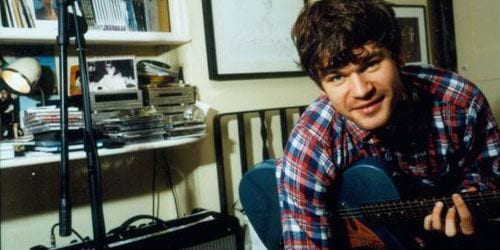
Jack Peñate is an allegedly fun-spirited British singer-songwriter, with goofy literary ambitions, and a notion of eclecticism that reduces every style his strumming-hand touches to value-neutral kitsch: ska, rockabilly, quasi-funk, that Arcade Fire Histrionic Indie Rock Thing. In his hands, all are performed hastily and almost sarcastically, kind of like watching some hyperactive street performer bullet through seven or eight impersonations in the same South London accent. Like, “Hey, guys! Here’s my Save Ferris moment! Oh, you liked that? Watch me do R.E.M.”
On stage, or maybe even on YouTube, that stunt show could pass for a cheery, and who knows, maybe even impressive spectacle, some kind of schmaltzy dig at the old singer-songwriter stereotype. But on Matinée that act is rattled by a nervous energy that takes away from his spontaneity, and inspires snappy arrangements that come and go with neurotic frequency. Across all 10 mawkish tracks, Peñate runs through infectious grooves like Henry VIII did wives, chucking them aside as quickly and predictably as legally feasible. As it was with Ol’ Henry, Peñate’s commitment-phobia might mask a certain form of impotence: Is this Jack of All Trades, Hank of all Skanks afraid to let a ska groove evolve organically into a larger statement?
Here’s the opening soliloquy on “Torn on the Platform”, which starts off with gentle electric guitar swipes, and just a smidgen of train station ambiance — you know, a lady on the intercom announcing train schedules and departures and such:
Once more just before I’m leaving, torn on the platform.
Once more just before I’m leaving, torn on the platform.
Cause I miss you. And I love you. And I know this is over for now.
Cause I miss you. Oh, how I miss you.
You’re not my girl. You’re my… town.
Peñate enunciates” town” with a soft, hesitant sigh — as if the simple fact that “Torn on the Platform” is a song about a place (London), not a woman is a delicate secret which must be unwrapped slowly, then carefully released into the world like a broken butterfly. One cliche crash cymbal latter, he lunges light-speed into a spiky guitar pattern with frantic drums, and simmering, furious, euphoric harmonies — all of which lasts 11 seconds before collapsing into a languid one-drop reggae rhythm, over which Peñate finds himself back in a mopey mood. That’s fairly indicative of how Peñate rolls.
But who and what function does all this mood/shape/genre-shifting serve? At their best, Peñate’s spasmodic arrangements trivialize mood swings into silly, nebulous distractions, as neither here nor there, including the political ramifications of co-opting a reggae rhythm to mourn one’s tragic distance from the capital of British colonialism. If you live a wired, Ritalin-powered existence, defined by emotional collapses timed to last no longer than a commercial break, you might see a bit of yourself in Peñate. And for listeners trapped in the throes of early adolescence, his impulsive mood-swings could provide a useful step stool towards the confident detachment and jaded cheer of Lily Allen.
For the rest of us, however, our take on Peñate is going to pivot on whether he strikes us as a harmless spoof of a singer-songwriter, or an unbearably poor imitation. Ask yourself how you feel about a gushing lyricist who casually drops the word “Gregorian” like it was a silk handkerchief, unflinchingly climaxes one song (“Got My Favorite”) with the lyrical nugget “yo-ho-ho and a bottle of rum”, and tosses around self-composed proverbs with daunting temerity. The type of guy who boasts, without a trace of irony, “It’s very rare / That I don’t stare / At objects to find beauty”. (Didn’t that kid from American Beauty already use that pick-up line?) A showboat more than willing to rhyme “cupid” with “stupid”, or tout the hook “we all spit at stars” like it’s a generational rallying cry on par with “Hey, hey we’re the Monkees.”
If said wince-inducing moments strike you as camp and corniness, then great. You can now return to your regularly scheduled 38-minutes of infectious grooves and blitzkrieg shuffles. Dance your heart out. The rest of us heavy-feet will have to contend with the nagging thought that Peñate is one of the more familiar characters in the field of aspiring musicians: the insecure, but nonetheless conceited singer-songwriter who wallows in the mythology of the gifted artiste, except when passing off his numerous shortcomings as schlock. Personally, your humble reviewer stakes out that second position. The coup-de-grace was the inane number of times he repeats his climactic lyric on “We Will Be Here” — “I can wish upon a star, but wouldn’t wish to be that far”. As if the mantra is supposed to take on new meanings during repetitions six-through-nine. Or maybe it was Peñate’s wistful complaint on “Learning Lines” that “dreaming’s become my life”, and it would “be so easy if I wanted to charter survey”. (Oh, the deplorable lot of a self-anointed songwriter.) Or maybe it was the apoplectic Strokes spin-off “Run for Your Life”, about the entire history of violence, including all those modern day vandals out there “fighting, biting”, “hitting, spitting”, and “shanking, skanking”, respectively. (Question: Are England’s gun control laws so strict that thugs have to resort to biting people?)
Even if you take Peñate as an innocuous spoofball, in moments like these he confirms some of the worst singer-songwriter stereotypes: self-conscious but not self-aware, full of false modesty and trite observations about the human condition. For all his sprightly humour, he doesn’t always come off like the most pleasant of dudes — wonder how controlling of a bandleader the style-juggler is — and on Matinée, he’s less than charming.

![Call for Papers: All Things Reconsidered [MUSIC] May-August 2024](https://www.popmatters.com/wp-content/uploads/2024/04/all-things-reconsidered-call-music-may-2024-720x380.jpg)



